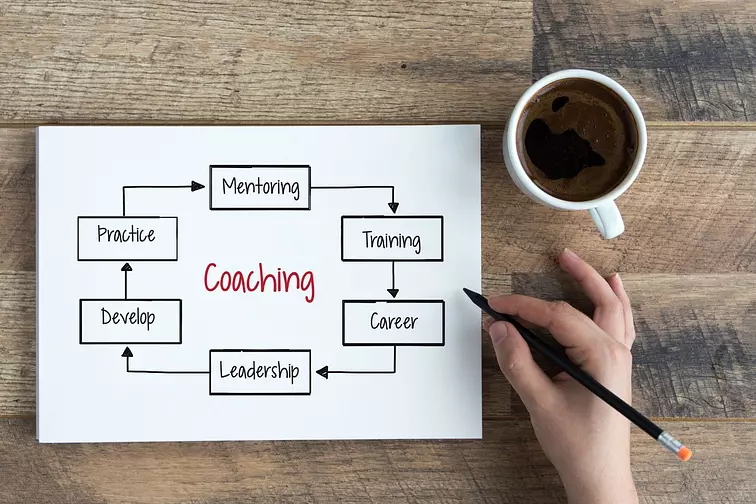April 30, 2022 - Coaching Business
Effective Life Coaching Models for Coaching Success
Four coaching models to help you effectively structure your coaching sessions
.jpg)
Your main focus as a coach is to guide your clients with insights towards clarity and finding solutions to overcome their challenges and get to the desired goal.
There are a variety of coaching models that can be used for this purpose. Some coach training institutions such as the International Coach Academy even have their students create their own unique coaching model as part of the curriculum.
In this article, we explore four different life coaching models that you can use to help make your coaching sessions more effective.
WHAT ARE LIFE COACHING MODELS?
As a life coach, you may be exploring different life coaching models and how to apply them during your coaching sessions.
According to Lifecoachcertification.com, a ‘coaching model’ is a set of principles, actions, and steps that you can take with a client so that you can structure a session for your client’s best benefit.
Do keep in mind that coaching models should not be confused with coaching styles. In fact, a coaching model should work in harmony with your individual coaching style. If you are curious to find out more about coaching styles and how you can use them together with your chosen coaching model, check out our article on the Six powerful coaching styles that you can apply.
BENEFITS OF USING A COACHING MODEL
Using a coaching model helps in numerous ways.
One of the benefits is that it helps to provide a purpose to the coaching session by defining an outcome at the beginning, thus preventing it from becoming a chat with no clear purpose.
According to Coachfoundation.com, here are more useful benefits when you use a life coaching model:
- You get to check on your client’s performance and your accountability too!
- Easier to manage agreements between you and your clients
- Efficiently manage your time and make yourself productive
- Create a growth mindset, which is very important for any change to take place
- A good coaching model provides you with flexibility in your functioning as a coach
- Helps in moving forward when clients get stuck on their problems or past mistakes
- Easily measure performance and ROI (return on investment)
4 EFFECTIVE COACHING MODELS
1. GROW
GROW is probably the most widely known and used coaching model. This model helps you to take your coachee from goal setting at the outset of the session, through to exploring where they are now in relation to their goals, exploring options they have for moving forward and concluding with a commitment to action.
Citing from Positivepsychology.com, this is what GROW stands for:
G - Goal, where do you want to be?
R - Reality, where are you now?
O - Options, what could you do to get there?
W - Will, what will you do?
Let’s go deeper into what GROW does for you and your client.
GOAL
As a coach this is where you help your clients set goals, both within each session and an overarching goal to accomplish throughout their coaching journey with you. You will guide your clients to define their goals, what they want to talk about, the significance of the topic, and what challenges they face in reaching their goals.
REALITY
This is where you help your clients to understand the reality of the situation and where they are in relation to their goal. You will help the client understand themselves, their strengths and their skills.
OPTIONS
Next step would be to help your client discover the different ways that they can achieve their goals. The client and coach explore various options that the client can utilize to achieve their goals with out-of-the-box coaching questions such as, ‘What if time doesn’t matter for you, what would you do?’
WILL
With a list of options in hand, the client must now commit to what they will do next.
Coachfoundation.com says it best, that: ‘The main idea at this step is to help your clients understand how they can move forward from their current Reality and towards their Goals while keeping in mind their Options or Obstacle’.
2. OSCAR (also known as OSKAR)
According to Positvepsychology.com, the OSCAR model was initially described by Gilbert and Whittleworth in 2002. Rather than focus on the problem, this model focuses on the solution (Gilbert & Whittleworth, 2009):
O - Outcome To understand the desired outcome and the individual’s long-term goals.
S - Situation Help the client become aware of their skills, abilities, level of knowledge, and how they feel.
C - Choices What are the options for reaching the desired outcome?
A - Actions Identify the improvements and how best to make them.
R - Reviews Hold regular reviews to ensure the client is on track.
Let’s go deeper into what OSCAR does for you and your client.
OUTCOME
The first stage of this model involves helping the client understand what outcome they’d like to see from coaching. You will guide your client to clarify their goals and what they’d like their life to look like in the long run.
Manage Your Coaching Practice in One Place
CoachVantage automates your business workflows so you can focus on impactful coaching results.
SITUATION
This second stage involves asking the client about their current surroundings and if they have any enabling factors.
On a scale of 1-10, ask your clients where they are in relation to the goal and their belief that they can achieve their goal with 1 being very far away and not confident, and 10 being very close and very confident.
CHOICES
In this third stage, your clients describe all the possible choices or options they can make to achieve their Outcome.
ACTIONS
With all the choices that your client has listed, this fourth step is to encourage your clients that the Choices they made are possible and proceed to make a plan of actions.
REVIEWS
Even though this is the final step, this step is crucial.
This final stage of the OSCAR coaching model is for reviewing progress against actions and is therefore most likely to take place at the beginning of the next coaching session. The emphasis is on reviewing the positives:
- What is better?
- What did you do that made change successful?
- What do you think will change next?
3. CLEAR
The CLEAR coaching model was developed by Peter Hawkins in the early 1980s and is considered a viable alternative to the GROW model (Bates, 2015). This type of coaching model works exceptionally well for clients who know exactly what they want.
C - Contracting
L - Listening
E - Exploring
A - Action
R - Review
CONTRACTING
According to Positivepsychology.com, this first step is to establish the desired outcomes, the session’s scope, agree on the coaching process and fill out any paperwork associated with the coaching process.
LISTENING
As a coach you are encouraged to listen and only engage to nudge and steer the conversation toward the topics under review. To be a successful coach, you start with polishing your active listening skills in this step.
EXPLORING
The exploring state is when the coach first helps the client understand the consequences of the situations and all of the ways that it’s affecting their life. The coach then proceeds to help challenge the client to think about different options that they can utilize to solve their problems and address their issues.
ACTION
This is where your clients take the exciting next step into transforming.
At this stage the coach guides the client to select the best course of action that they can take to reach their goals or resolve the issue that they’re working on in coaching.
REVIEW
This final step calls for you as a coach to perform follow-ups with the individual to assess how things are progressing and identify what worked well in the coaching sessions.
4. STEPPA
According to Positivepsychology.com, STEPPA was developed by Angus McLeod and is based on the idea that emotion drives behavior.
S - Subject identification
T - Target Identification
E - Emotion
P - Perception and choice
P - Plan and pace
A - Action/amend
SUBJECT IDENTIFICATION
This first stage involves the coach and client discussing goals and any issues that the client would like to resolve in coaching.
TARGET IDENTIFICATION
Stage two of the STEPPA coaching model consists of the coach and the client arriving at a clear goal or outcome (define using SMART).
Target identification is when a client discovers what they’d like to work on in coaching. Not all clients know this before they enter coaching. The coach then helps them assess how realistic their goals.
EMOTION
This is the key part of this coaching model.
According to Lifecoachcertification.com, in this stage, as a coach, you need to understand if the emotions associated with your clients are going to boost or block their progress toward the goal.
Emotions are one of the biggest motivators there are and therefore emotions are essential in staying motivated toward reaching a goal.
This model is really best for those clients and coaches who are somewhat comfortable with emotional expression and exploring emotional issues in coaching. Prior training in counseling may be an essential tool for a coach who wishes to pursue this method.
PERCEPTION AND CHOICE
In this fourth stage, the coach guides the client to expand their perception to have a greater understanding of their goals and the purpose of coaching.
This stage can be helpful for clients, in conjunction with the emotion stage, to help clients identify what exactly is motivating them to work toward their goals. This makes narrowing down ways of achieving the goals much simpler and streamlined.
PLAN AND PACE
At this stage, the coach helps the client come up with a plan of action to reach their goals and how fast they plan to achieve said goal. This will help the client get really clear on what their next steps are.
ACTION AND AMEND
This is the final stage when the client commits to what actions will help them achieve their goals and begins to implement these actions into their life.
CONCLUSION
All of the above coaching models serve the coach and the client differently and provide a customized coaching experience when used individually or separately.
The model that works for one client may not work for others hence it will take work, focus, consistency and commitment.
A common feature of the life coaching models described above is to have a clear understanding of your client’s goals and desired outcomes. It’s important to always keep sight of this to effectively track how your coaching sessions are progressing.
CoachVantage is a coaching platform that helps both coach and client to record and track their goals. It has a goal-tracking feature built-in so that you can set out clearly defined goals and your clients can check off the milestones (or checkpoints) leading to the accomplishment of the overall goal.
Get started with CoachVantage for free and see for yourself how effective this can be to help your clients get the results they want.
You might also like...
.png)
Top Social Media Marketing Tips for Coaches that Work in 2025
.png)
Top 7 Health and Wellness Coaches That Can Aid You On Your Fitness Journey





